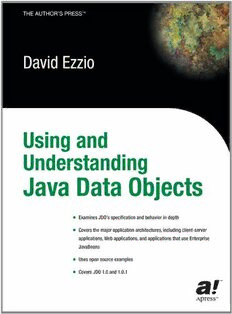Download Using and Understanding Java Data Objects PDF Free - Full Version
Download Using and Understanding Java Data Objects by David Ezzio in PDF format completely FREE. No registration required, no payment needed. Get instant access to this valuable resource on PDFdrive.to!
About Using and Understanding Java Data Objects
"Using and Understanding Java Data Objects" is an application programmer's guide to the Java Data Objects (JDO) specification recently accepted by the Java Community Process. JDO provides a universal and transactional persistence service for objects. JDO will store and retrieve objects of nearly any application defined class using any data storage technology for which a JDO implementation is available. JDO completely encapsulates the details of the underlying data storage technology that is used. JDO has its own query language (JDOQL) that allows the programmer to find objects based on the fields and relationships of the object model. The syntax of JDOQL is similar to the syntax of Java itself. JDO increases programming productivity by simplifying and minimizing the code that must be written to store and retrieve object state. The use of JDO also allows the application to be ported across different data storage technologies. Like the servlet and EJB specification, JDO is a standard that will be implemented by competing software vendors. Several JDO implementations are currently available as third party products for relational databases and object oriented databases. "Using and Understanding Java Data Objects" is a guide to the features and uses of JDO. Part I is a guide to the JDO API, the JDO metadata, and JDO's byte code enhancement. Part II explains the use of JDO in several application deployment scenarios, including stand-alone, client-server, servlet, and EJBs. Part III is a tutorial explaining the example programs and learning tools supplied with the book.
Detailed Information
| Author: | David Ezzio |
|---|---|
| Publication Year: | 2003 |
| ISBN: | 9781590590430 |
| Pages: | 371 |
| Language: | English |
| File Size: | 6.112 |
| Format: | |
| Price: | FREE |
Safe & Secure Download - No registration required
Why Choose PDFdrive for Your Free Using and Understanding Java Data Objects Download?
- 100% Free: No hidden fees or subscriptions required for one book every day.
- No Registration: Immediate access is available without creating accounts for one book every day.
- Safe and Secure: Clean downloads without malware or viruses
- Multiple Formats: PDF, MOBI, Mpub,... optimized for all devices
- Educational Resource: Supporting knowledge sharing and learning
Frequently Asked Questions
Is it really free to download Using and Understanding Java Data Objects PDF?
Yes, on https://PDFdrive.to you can download Using and Understanding Java Data Objects by David Ezzio completely free. We don't require any payment, subscription, or registration to access this PDF file. For 3 books every day.
How can I read Using and Understanding Java Data Objects on my mobile device?
After downloading Using and Understanding Java Data Objects PDF, you can open it with any PDF reader app on your phone or tablet. We recommend using Adobe Acrobat Reader, Apple Books, or Google Play Books for the best reading experience.
Is this the full version of Using and Understanding Java Data Objects?
Yes, this is the complete PDF version of Using and Understanding Java Data Objects by David Ezzio. You will be able to read the entire content as in the printed version without missing any pages.
Is it legal to download Using and Understanding Java Data Objects PDF for free?
https://PDFdrive.to provides links to free educational resources available online. We do not store any files on our servers. Please be aware of copyright laws in your country before downloading.
The materials shared are intended for research, educational, and personal use in accordance with fair use principles.

